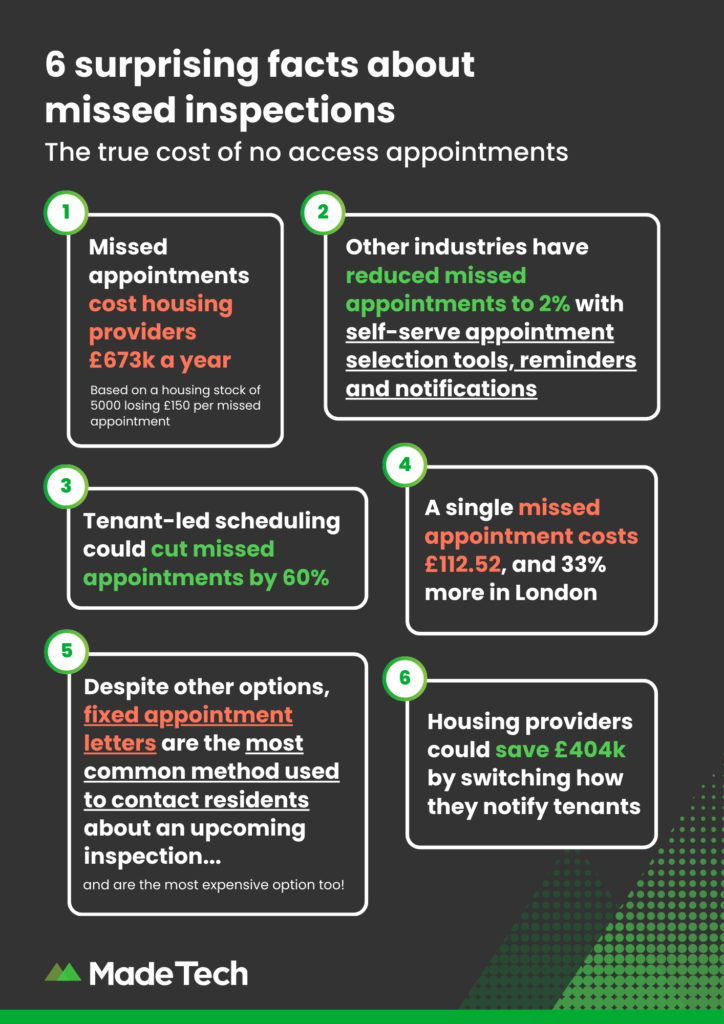The cost of missed appointments
Missed appointments are a significant issue for social housing providers, costing an average of £112.52 per missed appointment outside London and around £150 within London.
Inside Housing data suggests that around 30% of all appointments with tenants are missed, resulting in high costs and lost time for repair teams. This issue impacts resident satisfaction, housing team efficiency, and overall service quality.
To address this, housing teams need to understand the key factors driving missed appointments and consider how technology and better communication can help minimise these occurrences.
Factors contributing to missed appointments
Through extensive discussions with over 60 social housing providers and insights gathered from contact centre staff, housing managers, and repairs operatives, we’ve identified common patterns and root causes.
We’ve also consulted resident research groups and digital literacy groups, testing our range of specialist social housing products with them to ensure they address these barriers effectively.
By sharing these findings, we aim to empower you with practical knowledge informed by other organisations and tenants, to help improve scheduling efficiency, minimise costs, and ultimately enhance the resident experience.

1. Lack of timely notifications
Often, residents don’t receive appointment details promptly, particularly when information is sent via post. Letters may arrive too late, or specific times may not be convenient.
Solution: Use a mix of digital communication methods, such as SMS and email, which are faster and more reliable for reaching residents with appointment details.
See more on how flexible scheduling can reduce missed appointments here.
2. Insufficient reminders
Without reminders, many people simply forget about their scheduled appointments, a common issue across sectors including healthcare.
Solution: Implement automated reminder systems that send SMS and email notifications close to the appointment date.
3. Difficulty rescheduling
Limited call centre hours or lack of alternative contact options can make it challenging for residents to adjust appointment times to fit their availability.
Solution: Provide multiple options for rescheduling, such as online portals, automated telephone systems, or a text-based service accessible 24/7.
4. Delayed processing by contact centres
Even if a resident responds, delays in processing can mean that changes to appointments don’t reach the repairs team in time. This is particularly problematic if contact centres are only available during standard business hours.
Solution: Integrate scheduling systems so that changes are updated in real-time for both contact centres and repairs teams.
5. Unclear appointment information
Confusion around the exact time, location, or purpose of the appointment can lead residents to misunderstand or overlook it.
Solution: Ensure all communications are clear and detailed, providing explicit information on the date, time, purpose, and any preparation the resident may need to make.
6. Low digital literacy or technology access
While digital notifications and scheduling options are beneficial, not all residents may have access to digital tools or feel comfortable using them.
Solution: Offer alternative communication methods such as phone reminders or paper notifications alongside digital options, ensuring accessibility for all.
7. Lack of trust in service reliability
Previous experiences with rescheduled or cancelled appointments may reduce residents’ motivation to prioritise future appointments.
Solution: Build consistency in appointment scheduling and communicate any unavoidable changes clearly to help rebuild trust and show commitment to reliability.
8. Health and personal issues
Unforeseen health or personal issues can prevent residents from attending scheduled appointments, particularly for those with chronic conditions.
Solution: Allow for flexible rescheduling, making it simple to cancel or reschedule when personal or health issues arise.
9. Cultural or language barriers
Language or cultural differences may lead to misunderstandings about the appointment details or importance.
Solution: Provide multilingual support and ensure communications are accessible to diverse communities, reinforcing the importance of the appointment.
Summary of key factors and solutions
Missed appointments in social housing are often due to communication gaps and limited accessibility. Residents may not receive timely notifications, struggle with inflexible rescheduling options, or lack trust in the service due to past cancellations. Limited digital access or literacy, along with health, cultural, or logistical barriers, also hinder attendance.
To address this, housing providers should adopt a multi-channel communication strategy with SMS, email, and automated reminders. Providing 24/7 self-service rescheduling options helps residents manage appointments at their convenience. Clear, consistent communication and reliable service build trust, while alternative communication methods and flexible scheduling accommodate diverse resident needs.
Reasons for missed appointments
- Didn’t receive the appointment notification in time (particularly by post).
- No reminder was sent, leading to forgotten appointments.
- Limited options for changing or rescheduling the appointment.
- Delays in processing appointment changes within contact centres.
- Unclear appointment details.
- Limited access to or familiarity with digital tools.
- Low trust in appointment reliability.
- Health or personal challenges.
- Cultural or language barriers to understanding appointment information.
Recommended solutions
- Use faster, more reliable notification methods like SMS and email.
- Send automated reminders via SMS and email.
- Offer 24/7 options for rescheduling, including online portals and text-based systems.
- Ensure contact centres have real-time access to scheduling changes to avoid delays.
- Provide clear, detailed appointment information.
- Offer alternative communication channels for residents with low digital literacy.
- Build trust with consistent, reliable service.
- Simplify rescheduling for those with health or personal difficulties.
- Ensure multilingual and culturally sensitive communication.
By addressing these common challenges, housing teams can reduce missed appointments, saving time and resources while improving the resident experience. Implementing flexible scheduling and diverse communication channels helps residents stay informed and empowered to manage their appointments, resulting in higher attendance rates and more efficient service delivery.
We’re addressing this costly issue with Inspection Scheduling, our product dedicated to streamlining the process of booking mandatory inspections. With Inspection Scheduling, tenants will receive automated communications to book an appointment time that suits them, with reporting tools to enable your team with the data they need to track these appointments and comply with auditors.




